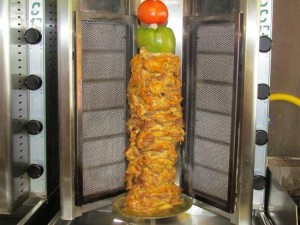Like Sloan’s Patrick Pentland, I used to be a fan of donairs, kebabs and street meat. Or late-night chinese food. Anything heavy and greasy tastes good after a few beers, but the places serving them have to know the risks associated with what they are serving, and where things might go wrong.
About a decade ago donairs or kebabs were linked to three outbreaks of E.coli O157 in Alberta, and I stopped eating them.
Outbreak investigators found that traditional cooking practices including a rotating a cone of meat next to a heat source, were problematic.
Often, especially in the post-bar-closing rush, the heat sources are turned up so the outside of the cone gets scorched, but meat just below the surface doesn’t reach safe temperatures (because it’s being cut off quickly to meet demand). The cooking practice, along with the tendency for the meat cones to be made with ground meat and stored frozen can cause a perfect outbreak scenario.
A national committee was created to look at donair risks associated and the group recommended grilling post cone cut-off to ensure pathogen-killing temps. Good call.
And for those in Australia looking to learn more about kebab culture, according to news.com.au, there’s a reality show for you.
No matter your choice of filling, it’s almost a rite of passage to end up at a kebab shop after a big night out.
A kebab shop worker witnesses everything you would rather forget in the morning.
He sees when you spill the sweet chilli sauce down your white shirt or shamefully profess your love to a stranger.
Mustafa Mohammed has owned Smith Kebabs in Collingwood for more than four years. He has seen it all and has never had a dull moment.
“We get a lot of drunk people in our area, there are a lot of clubs and we have to be patient every day,” he said.
“The challenges are people drink too much and they can’t stand and sometimes can’t even talk.
“They just come in and say ‘I want a kebab’ and you have to try and communicate with them politely to find out what they want.”
Mr Mohammed’s story and the antics in his shop will be revealed on a new miniseries on SBS called Kebab Kings.
Executive producer Michael Cordell said cameras were set up in the kebab shops during peak periods.
“We thought the kebab shops provided an unusual window into contemporary Australia,” he said.
